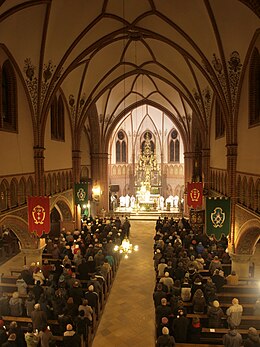
Church membership, in Christianity, is the state of belonging to a local church congregation, which in most cases, simultaneously makes one a member of a Christian denomination and the universal Christian Church.[2][3] Christian theologians have taught that church membership is commanded in the Bible.[4][5] The process of becoming a church member varies based on the Christian denomination. Those preparing to become full members of a church are known variously as catechumens, candidates or probationers depending on the Christian denomination and the sacramental status of the individual.[6][7]
- ^ Chanchreek, K. L. (2007). Encyclopaedia of Great Festivals. Shree Publishers & Distributors. p. 119. ISBN 978-81-8329-191-0.
The traditional, liturgical observation of Easter, as practised among Roman Catholics and some Lutherans and Anglicans begins on the night of Holy Saturday with the Easter Vigil...it is the time when new members are initiated into the Church, and it is being revived in some other circles. Whether there are baptisms at this point or not, it is traditional for the congregation to renew the vows of their baptismal faith.
- ^ Simcox, William Henry (1881). The Beginnings of the Christian Church: Lectures Delivered in the Chapter-room of Winchester Cathedral. Rivingtons. p. 254.
...even in these the supreme authority on all spiritual matters is, to his mind, the Church--the Church Universal, represented to the individual by the local Church of which he is a member; that local Church being represented by its bishop, presbyters and deacons.
- ^ The Transitional Book of Doctrines and Discipline of the Global Methodist Church. Global Methodist Church. 2021. p. 25.
All baptized or professing members of any local Global Methodist congregation are members of the Global Methodist Church and members of the church universal.
- ^ Cite error: The named reference
Garrison1908was invoked but never defined (see the help page). - ^ Pribble, Stephen (2003). "Is Church Membership Optional?". Orthodox Presbyterian Church. Retrieved 12 June 2021.
- ^ Cite error: The named reference
UD2021was invoked but never defined (see the help page). - ^ Cite error: The named reference
AMEZ2012was invoked but never defined (see the help page).